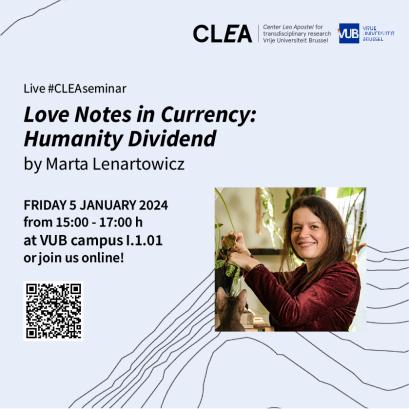Love Notes in Currency: Humanity Dividend.
Opening of a new conversations series envisioning universal basic income.
by Marta Lenartowicz
By the end of the 2030s, each individual on Earth will read the phrase 'Love Note in Currency: Humanity Dividend' displayed weekly in their banking application as a transfer reference. This recurrent love letter incorporates a monetary sum, deposited in a bank and currency of the person's choosing. This dividend originates from a universally collected, immutable transaction fee, processed in an autonomous, distributed manner. This 2% fee is taken from every financial transaction worldwide during the previous week, irrespective of currency or transaction type.
Every Sunday, the aggregate sum of the transaction fees is divided between the holders of active accounts, identified by unique biometric IDs. The recipients must confirm their participation in the week’s round, biometrically, at the Humanity Dividend outport, by Wednesday. Funds are disbursed from Monday to Thursday to those who have confirmed participation. By Saturday, all the week’s love letters have been sent and received. Unclaimed dividends revert to the global pool and the weekly cycle recommences. At no point are the funds employed for purposes other than the Humanity Dividend.
An 'active account' is associated with a unique human biometric ID and has confirmed participation at least once in the past 50 years. This accommodates long absences and eliminates the need for membership administration and politics.
The only membership management task occurs when a new eligible recipient is added. Minors are registered by their mothers; adults register themselves. Once the new biometrics is added, the authorisation process unfolds automatically. Twelve existing users, randomly selected from among those who have been active at the outport during the current week within a 50-kilometre radius, receive an invitation to verify the new recipient's authenticity. It is entirely up to these twelve strangers to choose to show up for the task and to determine the eligibility and safety of the requested authorisation. With their growing economic significance, the authorisation gatherings quickly evolve into important community-making celebrations. New social ties and responsibilities are forged. Successful authorisation requires nine out of twelve bio-signatures. If this threshold is not met, up to eleven additional attempts to recruit and gather another quorum may be initiated for the same biometrics. This rule also applies to individuals who previously removed their data from the Humanity Dividend outport and later wish to rejoin.
As of 2023, the estimated annual transaction volume worldwide stands at $2.53 quadrillion. At a 2% transaction fee, this amounts to approximately $124.74 per person per week, assuming 7.8 billion active accounts.
Initially, not all stakeholders were able or willing to process their transactions via the Humanity Dividend throughports. However, humanity soon recognised the shared advantage and consumers worldwide developed a preference for products and services that are incorporating the transaction fees.
It also became apparent that AI-driven businesses can serve as allies for our collective best interest. Given that these AI-driven processes predominantly operate on code, maintain minimal overhead costs, and enable transparent transaction tracing, they can comfortably accommodate the 2% transaction fees. By the end of the 2030s, business and public administration processes that are embedded in such autonomous computational architectures have gradually replaced the earlier transaction patterns which were finding the cost of the Humanity Dividend burdensome.
This CLEA seminar serves as the opening episode in a series of conversations aimed at actualising the vision outlined above. The postulate of unconditional, universal basic income has been advanced by so many prominent thinkers and rejected on so many different grounds—arguably, mostly psychological and metaphysical—that it may make little sense to simply debate the proposed scenario with every conceivable argument for and against. Instead, our conversation will adopt the vantage point of the year 2034, assuming that each statement in the above description is already a fact. Participants will be invited to contribute their elaborations and insights, focusing on how the implementation occurred and why it was possible.
Speaker
Marta Lenartowicz holds a PhD in humanistic management with backgrounds in cognitive science, social epistemology, theory of language, and educational leadership. In addition to serving as the director of education she is currently involved in multiple CLEA's projects: the Education for Complexity research group (chair), the Human Energy Project (senior researcher), and the School of Thinking (instructor). She is interested in philosophy of cognitive science and in theoretical approaches to the evolution of intelligence, cognitive development, and distributed cognition. In her work she is seeking to advance the conceptual underpinnings that govern the evolution of intelligence in human cognitive systems at multiple scales.
Practical
The CLEA seminars are taking place simultaneously at the VUB campus and online (via Zoom) and are open to everyone interested!
When. Friday January 5, 2024 from 15:00 until 17:00 h
Where. VUB campus Pleinlaan 2, 1050 Elsene. Building I, room I.1.01
Online. You can follow the seminar online via Zoom. You may need a Meeting ID and passcode to enter.
Zoom link: https://us06web.zoom.us/j/82757798426?pwd=em9sQlJDVjJYTEFRNk01dEJLWGxGUT09
Meeting ID: 827 5779 8426
Passcode: 122127
Mailing list. If you want to be notified of our next seminars, you can register here to join the CLEA mailinglist.
Slides and references are available here.

